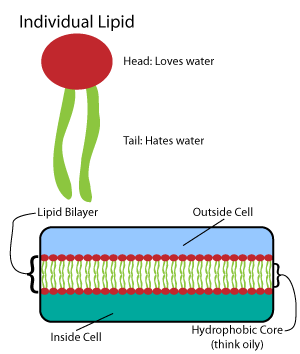Biosynthesis
Biosynthesis is the complex, multi-step, enzyme-catalyzed process by which living organisms produce organic molecules. In essence, it is the way in which living organisms convert simple substrates into more complex compounds, including amino acids, proteins, carbohydrates, lipids, and nucleic acids. These complex molecules are crucial for the structure, function, and regulation of the body's cells, tissues, and organs. Biosynthesis is a vital part of cellular maintenance, growth, and reproduction, allowing organisms to harness energy from their environment and convert it into a form that is usable at the cellular level.
Overview[edit | edit source]
Biosynthesis involves a series of chemical reactions that are catalyzed by enzymes. These reactions often require energy, which is typically provided by adenosine triphosphate (ATP), and may also need cofactors and coenzymes such as vitamins. The process can be divided into primary and secondary metabolism. Primary metabolism deals with the synthesis of essential molecules such as amino acids, nucleotides, and fatty acids, while secondary metabolism involves the production of non-essential but biologically active molecules, such as alkaloids and antibiotics, which may play roles in defense mechanisms and interactions with other organisms.
Key Processes[edit | edit source]
Amino Acid Synthesis[edit | edit source]
Amino acids, the building blocks of proteins, are synthesized through various pathways, often starting from intermediates in the Krebs cycle or other metabolic processes. For example, the amino acid glutamate is synthesized from alpha-ketoglutarate, a Krebs cycle intermediate.
Nucleotide Synthesis[edit | edit source]
Nucleotides, the building blocks of DNA and RNA, are synthesized from amino acids, carbon dioxide, and ribose 5-phosphate (a product of the pentose phosphate pathway). This process involves both de novo synthesis pathways and salvage pathways, which recycle the bases and nucleosides released during nucleic acid degradation.
Lipid Synthesis[edit | edit source]
Lipids, including fats, phospholipids, and steroids, are synthesized from acetyl-CoA, which is produced during the breakdown of carbohydrates and fats. Fatty acid synthesis involves the repetitive addition of two-carbon units to acetyl-CoA, while complex lipids such as phospholipids and cholesterol are synthesized through more elaborate pathways.
Carbohydrate Synthesis[edit | edit source]
Carbohydrates are synthesized from simpler molecules like carbon dioxide and water through processes such as photosynthesis in plants. In animals, gluconeogenesis allows for the production of glucose from non-carbohydrate sources, such as amino acids and glycerol.
Regulation[edit | edit source]
The biosynthesis of molecules is tightly regulated at multiple levels, including the transcriptional regulation of enzyme-coding genes, the post-translational modification of enzymes, and the availability of substrates and cofactors. This ensures that cells produce the right molecules in the right amounts at the right times.
Significance[edit | edit source]
Biosynthesis is fundamental to life, enabling organisms to grow, reproduce, and maintain their structures and functions. It is also the basis for biotechnology applications, including the production of antibiotics, insulin, and other therapeutic agents through microbial fermentation or plant-based systems.
This article is a biochemistry stub. You can help WikiMD by expanding it!
Search WikiMD
Ad.Tired of being Overweight? Try W8MD's NYC physician weight loss.
Semaglutide (Ozempic / Wegovy and Tirzepatide (Mounjaro / Zepbound) available. Call 718 946 5500.
Advertise on WikiMD
|
WikiMD's Wellness Encyclopedia |
| Let Food Be Thy Medicine Medicine Thy Food - Hippocrates |
Translate this page: - East Asian
中文,
日本,
한국어,
South Asian
हिन्दी,
தமிழ்,
తెలుగు,
Urdu,
ಕನ್ನಡ,
Southeast Asian
Indonesian,
Vietnamese,
Thai,
မြန်မာဘာသာ,
বাংলা
European
español,
Deutsch,
français,
Greek,
português do Brasil,
polski,
română,
русский,
Nederlands,
norsk,
svenska,
suomi,
Italian
Middle Eastern & African
عربى,
Turkish,
Persian,
Hebrew,
Afrikaans,
isiZulu,
Kiswahili,
Other
Bulgarian,
Hungarian,
Czech,
Swedish,
മലയാളം,
मराठी,
ਪੰਜਾਬੀ,
ગુજરાતી,
Portuguese,
Ukrainian
Medical Disclaimer: WikiMD is not a substitute for professional medical advice. The information on WikiMD is provided as an information resource only, may be incorrect, outdated or misleading, and is not to be used or relied on for any diagnostic or treatment purposes. Please consult your health care provider before making any healthcare decisions or for guidance about a specific medical condition. WikiMD expressly disclaims responsibility, and shall have no liability, for any damages, loss, injury, or liability whatsoever suffered as a result of your reliance on the information contained in this site. By visiting this site you agree to the foregoing terms and conditions, which may from time to time be changed or supplemented by WikiMD. If you do not agree to the foregoing terms and conditions, you should not enter or use this site. See full disclaimer.
Credits:Most images are courtesy of Wikimedia commons, and templates, categories Wikipedia, licensed under CC BY SA or similar.
Contributors: Prab R. Tumpati, MD





